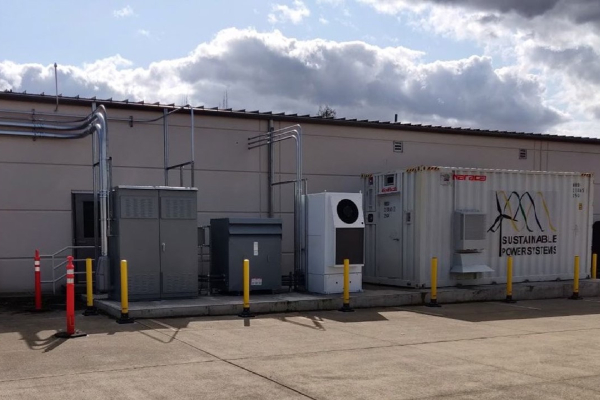In order to meet Oregon's ambitious clean energy targets established through House Bill 2021 while maintaining reliability for customers, Portland General Electric is working with organizations across the community to bring renewable and non-emitting resources to the grid at an accelerated pace.
Collaborating with key partners, PGE is making smart investments to advance decarbonization while managing costs and ensuring reliable power for Oregon.
In April, PGE announced the installation of the second-largest battery storage unit in the United States, adding 400 MW of power and in May procured the Evergreen battery energy storage system, a new 75 MW facility to be constructed in Hillsboro.
The Oregon Military Department's Anderson Readiness Center is another example of the efforts PGE is undertaking to bring added resiliency to communities.
"We are excited to partner with the Oregon Military Department to optimize the value of distributed energy storage resources, like the new microgrid at the Anderson Readiness Center, and its support for a more flexible and resilient grid," said Darren Murtaugh, PGE senior manager of Grid Edge Services. "Energy storage is a key resource that supports a clean energy future. In addition to the bulk energy service that energy storage provides to the grid, it is also an excellent resource to support customers by providing resilient backup power and improving integration of distributed renewable resources."
Working in collaboration with the Oregon Military Department, PGE and other partners completed a microgrid at the Anderson Readiness Center, which houses elements of the Oregon Army and Air National Guard and the Oregon National Guard's Joint Operations Center.
The on-site microgrid came fully online late this summer and includes solar panels and a battery energy storage system. The new system will play a crucial role in helping mitigate outages, adding a layer of resiliency that allows the facility to temporarily function independently from PGE's system in the event of a power disruption. It also allows for a seamless transition upon the restoration of regular power supply, ensuring uninterrupted operations.
"Partnering with PGE is a great way to further the Oregon Military Department energy resilience goals and help OMD work toward achieving the Dept. of Defense carbon reduction and energy management goals. This energy storage component adds to the existing 268 kW rooftop solar array completed by OMD in 2021," said Kenneth Safe, Oregon Military Department construction and facilities management officer. "Energy storage is a key element in the microgrid system that enables solar production to continue during a grid outage and creates the opportunity to reduce electricity costs through peak shaving. Adding energy storage to complete the microgrid at the ARC is ORNG's 2nd opportunity for energy storage following the Dallas Readiness Center energy storage project also completed in 2021."
Compared to the older diesel generators that offered backup power at the facility, the battery and solar system reduces the reliance on diesel generators, resulting in substantial fuel savings, noise reduction and providing emissions-free power. Moreover, the system also helps integrate more renewables into PGE's portfolio and is a tangible asset in the community contributing to the reduction of greenhouse gases.
Microgrids provide customers with clean and resilient power while also reducing emissions and controls expenses. Innovative tools like microgrids support PGE's clean energy future that brings affordable, reliable and clean energy to all.

The Anderson Readiness Center, located in Salem, Oregon, houses the Oregon Army and Air National Guard and the Oregon National Guard's Joint Operations Center. Photo Courtesy: PGE

Key components of the on-site microgrid at the Anderson Readiness Center include (from left to right): pad mounted Battery Energy Storage System (BESS) breaker and metering switchboard, isolation transformer, power conversion system and battery container. Working in collaboration with the Oregon Military Department, PGE and other partners completed the microgrid at the ARC, which houses elements of the Oregon Army and Air National Guard and the Oregon National Guard's Joint Operations Center. Photo courtesy: PGE
Portland General Electric (NYSE: POR) is a fully integrated energy company that generates, transmits and distributes electricity to over 900,000 customers in 51 cities across the state of Oregon. For more than 130 years, Portland General Electric (PGE) has powered the advancement of society, delivering safe, affordable, reliable and increasingly clean energy. To deliver on its strategy and meet state targets, PGE and its approximately 3,000 employees committed to partnering with stakeholders to achieve at least an 80% reduction in greenhouse gas emissions from power served to customers by 2030 and 100% reduction by 2040. PGE customers set the standard for prioritizing clean energy with the No. 1 voluntary renewable energy program in the country. Additionally, for the fifth year in a row, PGE was recognized by the Bloomberg Gender-Equality Index which highlights companies committed to creating a more equal and inclusive workplace. As a reflection of the company's commitment to the community it serves, in 2022, PGE employees, retirees and the PGE Foundation donated nearly $5.5 million and volunteered more than 18,000 hours with more than 400 nonprofits across Oregon. For more information visit PortlandGeneral.com/news.
For more information contact:
PGE Communications Team
503-464-2067
pgecommunications@pgn.com









